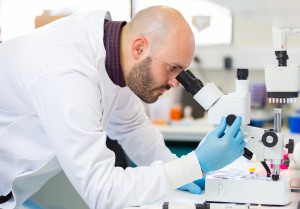Curtin Health Innovation Research Institute (CHIRI) researcher Dr Rodrigo Carlessi, from Curtin University’s Medical School, has received a Postdoctoral Fellowship from the Cancer Council WA for research to help predict liver cancer at its unseen stages.
Supported for three years with funding totalling $225,000, Rodrigo will progress a research project he is leading at CHIRI, examining a promising method for predicting liver cancer before its appearance in high-risk individuals, with the goal of designing the first screening program for the disease in Australia.
This welcome support from the Cancer Council WA will enable Rodrigo to test further an analytical platform he has developed working as part of CHIRI’s Liver Disease and Regeneration Laboratory. The platform involves acquiring large amounts of biological information from thousands of liver cells with an unprecedented level of detail.
“My aim is to use that technology to identify molecular signatures within damaged liver cells that can score risk and predict liver cancer before it develops, enabling screening for the disease to occur and for liver health to be restored before the damage becomes permanent and catastrophic,” Rodrigo said.
Using world-first experimental design, the research will analyse early biopsies and matched tumour material from two distinct preclinical models of liver cancer generated at CHIRI’s Liver Disease and Regeneration Laboratory, headed by Associate Professor Nina Tirnitz-Parker, and the lab of Professor Mark Febbraio at Monash University in Victoria.
The research also involves several other CHIRI and external collaborators who with Rodrigo and Nina form part of a multi-disciplinary research collaborative at the new $10 million WA Liver Cancer Centre.
With current treatment options proving more effective, and in some cases curative, when liver cancer is captured in its early stages, the Cancer Council WA’s investment in Rodrigo’s research has the potential to improve liver cancer survival rates and reduce the burden of this globally significant disease.
“Liver cancer causes about 10 per cent of all cancer-related deaths globally and in Australia, is the fastest increasing cause of cancer death,” Rodrigo said.
“With no reliable biomarkers or screening program for the early detection of liver cancer existing in Australia, patients are generally diagnosed with the disease at advanced stages, when treatment options are extremely limited.
“Development of a screening program is key for improving outcomes of liver disease patients, which is why support for research in this area is so important.”
The latest support for this research follows the Western Australian Cancer Single Cell Consortium’s awarding of $240,000 in funding in June 2020 to develop this promising line of research inquiry (read the article here).
